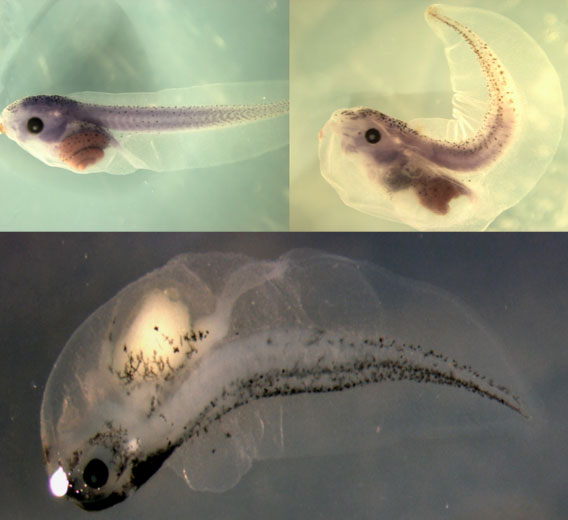Toxic Treatment
Tadpoles are found to develop deformities when exposed to common lawn herbicide
A common herbicide used to control weeds on golf courses and residential lawns disrupts the normal growth of tadpoles when they are exposed to the substance in the early stages of life, a Tufts study has found.

The widely used weedkiller atrazine has been found to disrupt growth in tadpoles during the phase in which organs are formed. Top left: an untreated tadpole; top right and below: those exposed to atrazine. Photos: Courtesy of Kelly A. McLaughlin
Atrazine, a weed killer once thought to be harmless, caused tadpoles to develop deformed hearts as well as impaired kidneys and digestive systems, according to a paper published in the February 2008 edition of Environmental Health Perspectives. Previous research had revealed negative effects of atrazine on amphibians extremely early and late in development. The new study shows that the herbicide disrupts growth during morphogenesis, the phase in which organs are formed.
Kelly A. McLaughlin, an associate professor of biology and lead author of the study, says organ morphogenesis is a brief and extremely sensitive phase in the tadpoles' growth cycle and that "amphibians are very vulnerable to contamination since atrazine is used in the same environs where they live and breed."
Atrazine works as a herbicide by blocking photosynthesis in plants. The researchers hope their findings will lay a foundation for further research to determine why and how atrazine exposure can affect several different organ systems during the same stage of early life. "We already have some ideas, and we're characterizing the molecules being affected by this particular chemical," says McLaughlin.
McLaughlin notes that all herbicides and pesticides have negative consequences. "It is necessary to understand those consequences so we can use them better," she says. "Part of the problem is that we don't really have something to replace atrazine that doesn't also have negative consequences. The more we learn about it, the more safely we can use it."
McLaughlin conducted the study with J. Michael Reed, professor of biology at Tufts, and Jenny R. Lenkowski, a doctoral candidate. Lisa Deininger, A07, participated in the research as part of the Summer Scholars Program. The work was funded in part by a $5,000 Tufts University Faculty Research Marshall Grant.


